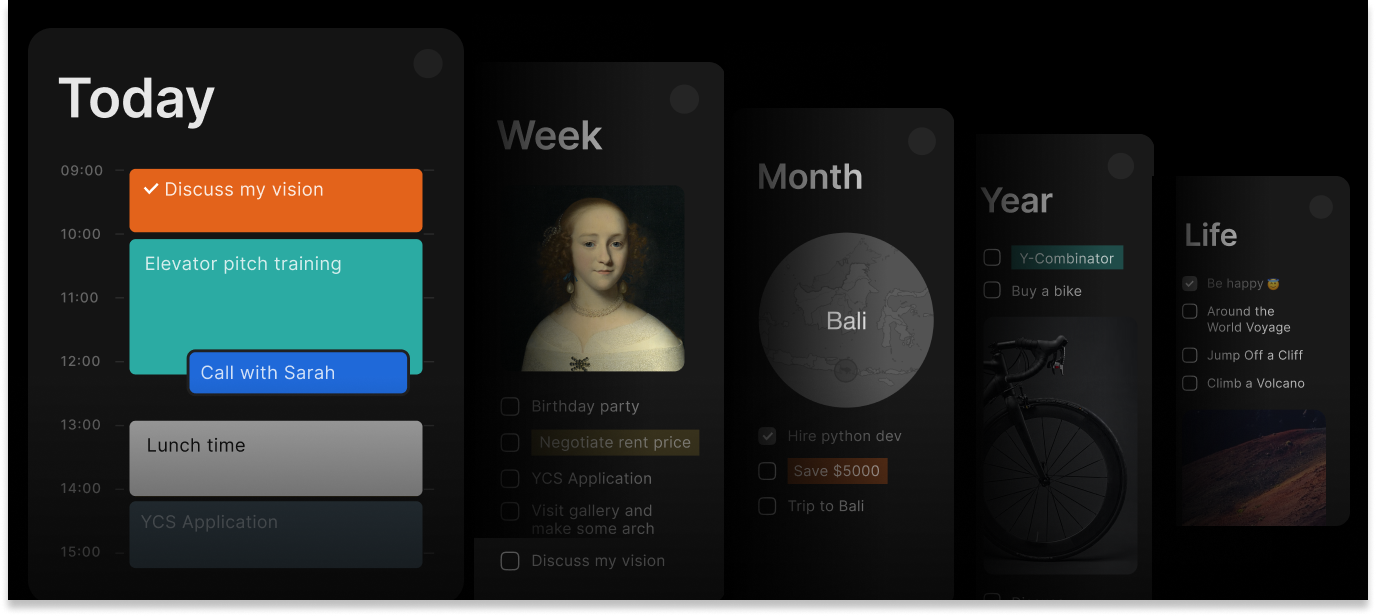Weekly planning: Master Your Schedule for Maximum Productivity

Google DeepMind, Unsplash
In today’s fast-paced world, weekly planning has become the cornerstone of personal and professional success. Whether you’re managing complex projects, balancing work-life priorities, or striving to achieve long-term goals, understanding how to plan your week effectively can transform your productivity. Creating a comprehensive weekly plan serves as your roadmap to success, while developing multiple weekly plans throughout the month ensures consistent progress. The art of week planning requires both strategy and flexibility, and a good weekly plan example might include time blocks for deep work, meetings, personal development, and buffer time for unexpected priorities. This comprehensive guide will explore everything you need to know about mastering strategic time management and maximizing your potential.
Why Bother With Weekly Planning? (Trust Me, There’s a Point)
I used to think planning was for people who had their lives way more together than I did. Turns out, it’s actually the opposite – planning is what helps you get your life together in the first place.
- Enhanced Focus Without the Overwhelm: You know that feeling when you sit down to work and spend the first 20 minutes just figuring out what to do? Yeah, weekly planning eliminates that. When you’ve already decided what matters most, you can dive straight into the work instead of spinning your wheels.
- Actually Having a Life Outside of Work: This might sound counterintuitive, but when you plan your work week properly, you protect your personal time better. You’re not constantly wondering if you forgot something important or feeling guilty about relaxing because you know everything’s accounted for.
- Less Stress, More Sleep: There’s something incredibly calming about knowing you have a handle on your week. Instead of lying awake at 2 AM mentally rehearsing your to-do list, you can actually rest because it’s all captured in your plan.
- Making Real Progress on Big Goals: Here’s where weekly planning really shines. Those important-but-not-urgent goals (you know, the ones that would actually change your life) finally get attention because you’re consciously making space for them each week.
- Better Decision Making: When someone asks you to take on a new project or attend another meeting, you can quickly see how it fits (or doesn’t fit) with your existing commitments. No more saying yes to everything and then wondering why you’re burnt out.
What Weekly Planning Actually Is (And Why It’s Not Just Another To-Do List)
Look, I get it. When someone mentions “weekly planning,” your eyes might glaze over thinking about another productivity system you’ll abandon after two weeks. But hear me out – this isn’t about color-coding everything or becoming a planning robot.
Weekly planning is really just taking a step back and looking at your upcoming seven days like you’re planning a road trip. You wouldn’t just hop in your car and drive randomly, hoping to reach your destination, right? Same principle here. You’re mapping out where you want to go and roughly how you’ll get there.
What makes weekly planning different from just scribbling tasks on sticky notes is that it connects the dots between what you do today and where you want to be months from now. It’s like having a conversation with your future self about what really matters.
The real magic happens when you stop feeling like you’re drowning in an endless ocean of tasks and start seeing patterns. You begin to understand what truly moves the needle versus what just keeps you busy. And honestly, that clarity alone is worth the 30 minutes you’ll spend planning each week.

Finding Your Sweet Spot: When to Plan Your Week
The “when” of weekly planning matters more than you might think. I’ve experimented with different approaches over the years, and here’s what I’ve learned works for different types of people.
The Friday Wind-Down Approach: If you’re someone who struggles to switch off from work mode, try planning your next week on Friday afternoon. There’s something satisfying about closing one week and setting up the next. Plus, you get to start your weekend knowing Monday won’t be a complete mystery. I find this works especially well if you’re the type who checks email on weekends anyway – at least now you’re being productive about it.
Sunday Evening Reset: This is probably the most popular approach, and for good reason. Sunday evening has this natural “fresh start” energy that makes planning feel motivating rather than like a chore. Your mind is usually calmer, and you can think more strategically about the week ahead. Just don’t do it too late – you want to go to bed excited about Monday, not stressed about everything you need to accomplish.
Monday Morning Launch: Some people prefer to plan on Monday morning, especially if their work involves lots of variables or if they get important updates over the weekend. The downside is that Monday mornings can already feel rushed, so you need to protect this time fiercely.
The key is picking a time when you can actually think clearly and won’t be interrupted. I’ve tried planning while distracted, and it’s basically useless – you end up with a list that looks like it was written by someone who doesn’t actually know your life.
Most people find that 30-45 minutes is the sweet spot. Long enough to be thorough, short enough that you’ll actually do it consistently.
How to Actually Plan Your Week (Without Making It Complicated)
Here's the thing about planning systems – they can get ridiculously complex if you let them. I'm going to share a process that actually works without requiring a PhD in productivity.
Start With a Reality Check: Before you plan anything new, look at what happened last week. Not to beat yourself up, but to get smarter. What took longer than expected? What got derailed, and why? What actually energized you versus what drained you? This isn't therapy – it's data collection.
Brain Dump Everything: Set a timer for 15 minutes and write down everything that's rattling around in your head. Work stuff, personal errands, that thing you promised to do for your friend, ideas for the weekend – everything. Don't organize it yet, just get it out of your head and onto paper (or screen).
Connect to Your Bigger Picture: This is where planning gets interesting instead of just being an elaborate to-do list. Look at your bigger goals – the ones that actually matter to you, not just the ones your boss cares about. What can you do this week to move closer to those? Even small progress counts.
Pick Your Top Three: If you could only accomplish three things this week, what would make you feel like the week was a success? These become your anchors – everything else is secondary. This might seem limiting, but it's actually liberating because it gives you permission to not stress about the other stuff if life gets crazy.
Block Time Like You Mean It: Here's where most people go wrong – they make lists but don't actually schedule when they'll do things. If it's not on your calendar, it's just a wish. Be realistic about how long things take and remember that your energy levels change throughout the day. Don't schedule your most demanding work for when you're usually running on fumes.
Build in Breathing Room: Life happens. Meetings run long, unexpected problems pop up, and sometimes you just need a mental break. If you pack your schedule like a game of Tetris, one small disruption ruins everything. Aim to schedule about 70% of your available time, leaving the rest as buffer space.
Using Timestripe to Make Weekly Planning Actually Enjoyable
Okay, full disclosure – I'm going to talk about Timestripe here because it genuinely makes weekly planning less of a chore and more of a strategic advantage.
The Horizons Feature Changes Everything: Instead of feeling like you're just managing tasks, Timestripe's Horizons feature helps you see how this week's work connects to your monthly and yearly goals. It's like having a GPS for your ambitions – you can see both where you are and where you're headed.
Time-blocking That Actually Works: You can drag and drop tasks directly onto your calendar, which sounds simple but is actually revolutionary. You immediately see if you're being realistic about time or if you're trying to fit 12 hours of work into an 8-hour day.
Breaking Big Goals Into Human-Sized Pieces: Complex projects can feel overwhelming until you break them down into weekly milestones. Timestripe's goal hierarchy system makes this intuitive rather than intimidating.
Planning With Others Without the Drama: If you work with a team or want to coordinate with family members, the sharing features let everyone see what others are working on without constant status meetings or check-ins.
Learning From Your Patterns: The analytics help you understand your own planning tendencies. Maybe you consistently underestimate how long creative work takes, or perhaps you're most productive on Tuesday mornings. This data helps you plan smarter over time.
The Planning Mistakes That’ll Drive You Crazy (And How to Avoid Them)
I’ve made every planning mistake in the book, so let me save you some frustration by sharing the big ones.
The Superman Complex: This is where you create a weekly plan that would be challenging for someone with superpowers and unlimited energy. We do this because we underestimate how long things take and forget that we’re human beings, not productivity machines. The fix? Start tracking how long tasks actually take you, and then add 25% to your estimates. You’ll be amazed at how much more realistic your plans become.
Ignoring Your Energy Rhythms: Scheduling demanding creative work for when you’re naturally sluggish is like swimming against the current – technically possible, but unnecessarily exhausting. Pay attention to when you feel sharp versus when you feel scattered, and plan accordingly.
The Rigid Schedule Trap: Life is messy, and plans that don’t account for this messiness break at the first sign of trouble. Build buffer time into your schedule like you’re planning for bad weather – you hope you won’t need it, but you’ll be glad it’s there when you do.
Task Switching Madness: Jumping between completely different types of work throughout the day is mentally exhausting. Try grouping similar tasks together or dedicating chunks of time to specific types of work.
Set-and-Forget Planning: Your weekly plan isn’t a contract written in stone – it’s a living document that should evolve as the week unfolds. Check in with it daily and adjust as needed.
Perfectionist Planning: Some people spend more time perfecting their planning system than actually executing their plans. Remember, a mediocre plan that you follow is infinitely better than a perfect plan that stays on paper.
The key insight here is that weekly planning is a skill, and like any skill, you get better with practice. Your first few weekly plans might be disasters, and that’s completely normal.
Ready to Take Control of Your Week?
I’m not going to promise that weekly planning will solve all your problems or turn you into a productivity guru overnight. What I will say is that it’s one of the most practical skills you can develop for making your time actually feel like it belongs to you.
The beautiful thing about weekly planning is that it’s not about becoming more busy – it’s about becoming more intentional. When you plan your weeks strategically, you stop feeling like you’re constantly reacting to whatever fires need putting out and start feeling like you’re actually steering your own ship.
It’s personal, too. What works for your colleague or your favorite productivity blogger might need tweaking for your situation. The key is to start with the basics and then adapt based on what you learn about yourself.
Whether you’re trying to advance your career, balance work with family life, or just want to feel less scattered and more focused, strategic weekly planning gives you a framework for making it happen.
Want to see what this looks like in practice? Timestripe makes weekly planning feel natural rather than forced. With features designed around how people actually work and think, it turns planning from a chore into a competitive advantage. Give it a try and see how much more manageable your weeks become when you approach them with intention rather than just hoping everything works out.
Read next

Ready to plan your week?
Start your trial of Timestripe today. Give it a try and see how much more manageable your time becomes.
Get Started

